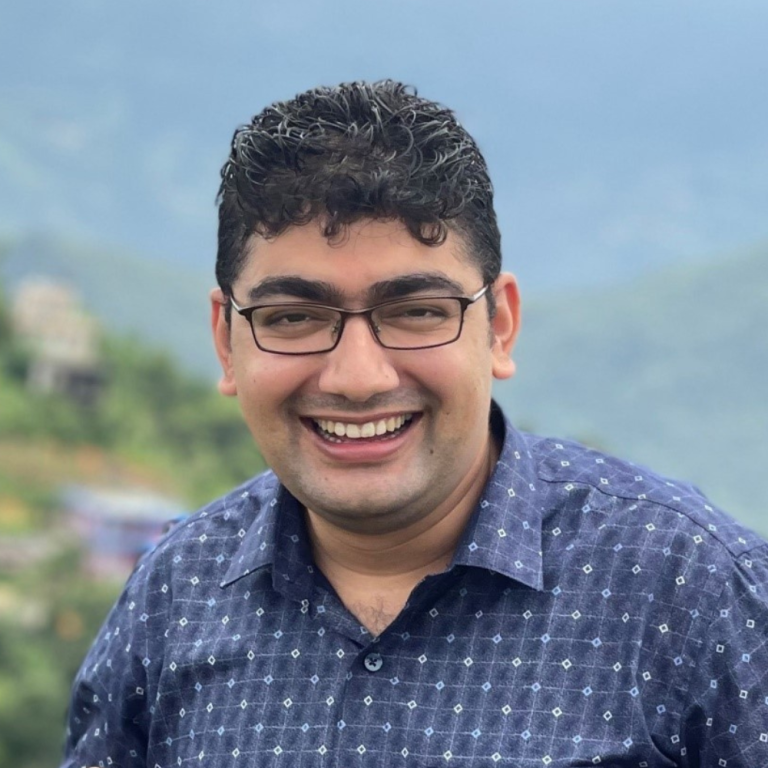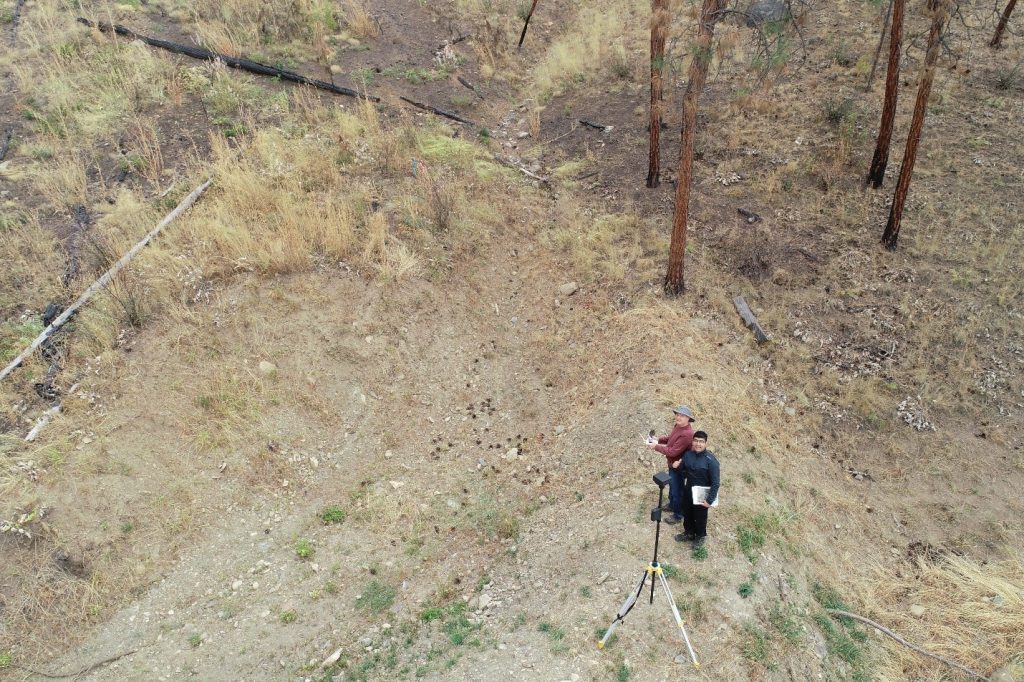 NAME:
NAME:
Kaushal Gnyawali
PROGRAM:
PhD in Civil Engineering
RESEARCH SUPERVISOR(S):
Dr. Dwayne Tannant
HOMETOWN:
Gulmi, Nepal
AWARDS:
UBC Okanagan Public Scholar
Coalition for Disaster Resilient Infrastructure (CDRI) Fellowship (2021-22)
4TU.DeSIRE Young Resilience Fellowship
RESEARCH DESCRIPTION
Debris flows and sediment-laden floods (hereafter called debris flows) are common geohazards in B.C. that disproportionately affect indigenous and rural communities. Climate change is causing more severe wildfires, damaging watersheds, and leading to destructive debris flows. People living in valley bottoms are vulnerable because they don’t recognize the risk of post-wildfire debris flows, are not familiar with possible mitigation methods, and have the least resources to protect themselves. There is an urgent need for research to develop mitigation measures for post-wildfire debris flows in order to increase resiliency to future events caused by extreme rainfall.
My research develops proactive risk mitigation strategies for post-wildfire debris flow hazards. During my fieldwork in several small watersheds in B.C., I found that debris flow impacts can be mitigated using inexpensive and easily constructed deflection berms and ditches. However, no proper design methodology exists for these small-scale structures, and their effectiveness is unknown in the context of future climate extremes. Thus, my research has the following aims:
- Document case studies of post-wildfire debris flow impacts at multiple locations in B.C. The focus is on small watershed outlets and the locations of infrastructure near valley bottoms.
- Develop a methodology to design, test, and evaluate the effectiveness and survivability of deflection berms in extreme rainfall and debris flow events using computer simulations.
- Make simple draft guidelines for post-wildfire debris flow mitigation to protect people and property and increase climate resilience.
I leverage high-resolution terrain point clouds to understand the micro-topography of small watersheds and combine hydrological analysis with computer flow simulations. The research aims to benefit rural and First Nations communities living along valley bottoms. The results will also help operators of linear infrastructure (highways, railways, and pipelines) implement sustainable, cost-effective mitigation structures for debris flow protection in small watersheds.
WHAT DOES BEING A PUBLIC SCHOLAR MEAN TO YOU?
The Public Scholar Initiative helps broaden my PhD research from disciplinary advancement to solving problems for public benefit and making my research more accessible. It expands my progressive research from my computer screen and publications into the public, industrial, and academic domains. This expansion makes me feel more responsible for my work and helps me navigate the broader public spectrum of Canada. It provides exposure and networking opportunities. Interactions and research discussions with other PSI scholars from different disciplines have helped me better understand my research applications and explore overlooked areas.
IN WHAT WAYS DO YOU THINK THE PHD EXPERIENCE CAN BE RE-IMAGINED WITH THE PUBLIC SCHOLARS INITIATIVE?
The Public Scholars Initiative takes the traditional Ph.D. concept—an independent, supervised research project making an original and significant contribution to knowledge—a step further. It adds three modern engine components to the Ph.D. experience: 1) increasing exposure (public, multi-sectoral, and multi-disciplinary); 2) encouraging non-traditional academic deliverables (going beyond research papers and theses); and 3) networking. It also helps us understand the value of research in other fields and helps us learn how to talk about ideas in a language that is not technical.
HOW DO YOU ENVISION CONNECTING YOUR PHD WORK WITH BROADER CAREER POSSIBILITIES?
In a broader sense, my Ph.D. reflects upon increasing public safety from geohazards. I plan to push the mitigation side of engineering research with economic and simple constructions and implement that in practice as a professional engineer. In parallel, I am also interested in the nexus of engineering practice, policy, and decision-making. In some ways, the PSI Fellowship is helping me explore and understand different career possibilities.

Dr. Dwayne Tannant and PhD student Kaushal Gnyawali standing on a deflection berm and flying a drone with a base station.
HOW DOES YOUR RESEARCH ENGAGE WITH THE LARGER COMMUNITY AND SOCIAL PARTNERS?
My research moves in partnership with the indigenous communities (Okanagan, Nicomen, and Bonapart Indian Bands), the B.C. Ministry of Forests, Stantec, and Clarke Geoscience. I collect field data from debris flow sites that impact indigenous communities. They help us understand the geomorphological and engineering perspective of the event. The B.C. Ministry of Forests provides fieldwork opportunities and shares data and hazard assessment reports. I worked as a contract-based part-time employee for the Ministry. Stantec and Clarke Geoscience provide field data and technical expertise for the research.
HOW DO YOU HOPE YOUR WORK CAN MAKE A CONTRIBUTION TO THE PUBLIC GOOD?
My research will add a step to improving disaster resilience in areas of steep terrain affected by debris flows. The research is applicable to most of British Columbia. The results also apply to other areas of steep terrain in western Alberta and the Yukon. Overall, the research outcomes will enhance the resiliency of Canadian infrastructure and rural and indigenous communities to the impact of post-wildfire debris flows and floods, which will get more severe due to climate change. The research will make vulnerable communities in Canada safer.
WHY DID YOU DECIDE TO PURSUE A GRADUATE DEGREE?
I was born and raised in the Himalayas of Nepal. There, landslides and debris flows are frequent disasters. I grew up seeing landslides blocking roads almost every year because I had to travel through these mountains from the city where I was being educated (Kathmandu) to my hometown (Gulmi). In my bachelor’s degree, this emotional attachment turned into a scientific curiosity to gain a deeper understanding of these hazards and how to stop them from killing people. Later, my curiosity could only expand after experiencing the 7.8-magnitude earthquake in 2015 that triggered thousands of landslides. These experiences deeply motivate me to research the mitigation side of these hazards. This is the motivation for my graduate study.
WHY DID YOU CHOOSE TO COME TO UBC OKANAGAN AND STUDY?
After completing my Master’s degree from Shanghai Jiao Tong University in China, I decided to pursue my PhD in landslides. Earlier, my research focused on understanding the hazard, but I had hardly designed any mitigation structure to stop the landslide hazard from becoming a disaster. Luckily, I got in touch with Professor Dwayne Tannant, who has excellent industry experience designing engineering mitigations and matching research interests. Along with this, the Okanagan’s beautiful weather, mountainous lakes, and forests make me feel at home away from home, so I chose this place.
Kaushal Gnyawali is a UBC Okanagan Public Scholar. Learn more about the Public Scholars Initiative (PSI).